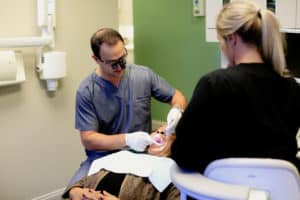November 16, 2015
Tooth enamel, or the outer surface of your teeth, is built to take a beating. In fact, it is actually the hardest substance in your body, even stronger than your bones. Yet, although they are tough, your teeth can still crack or fracture just like bones do.
What Are Some of the Causes of a Cracked Tooth?
There are a number of reasons that a tooth might crack. These reasons include:
- Biting down on hard foods like ice, hard candies, and nuts
- Stress that leads to jaw clenching or grinding
- Chewing unevenly
- Loss of tooth structure due to wear or large fillings
- Exposure to temperature extremes (such as eating hot food and then immediately washing it down with an ice cold glass of water)
- Brittleness of teeth following a root canal
What Are Some Signs that I May Have Cracked My Tooth?
Unfortunately, identifying a cracked tooth on your own may be difficult. Oftentimes, there is a vertical hairline fracture that may be nearly invisible to the human eye. Sometimes, these tiny cracks cannot even be seen on X-Rays. However, there are 5 warning signs of a cracked tooth of which you should be aware:
- Tooth pain when biting or chewing. This can be a good indicator of a cracked tooth; although you might not experience the pain every time you eat. It may only occur when you eat certain foods or bite down in a certain way.
- Lack of constant pain. Unlike a cavity or an abscess, the pain of a cracked tooth is sporadic. If you are not experiencing chronic pain, you are likely to have a tooth fracture.
- Increased sensitivity. You may notice that you experience pain when biting into hot foods or drinking cold liquids. Possibly, you may even experience sensitivity when eating sticky, sweet, or sour foods as well. Increased sensitivity may be a sign of a cracked tooth.
- Infection. At times, a cracked tooth can lead to an infection in the gum line around the area of the fracture. This infection would look like a small bump on the gum near the tooth.
- No visible signs. Often with a cavity, you can spot signs of decay. For instance, you might see a dark spot on the tooth’s surface or a hole where the enamel has eroded. If you are experiencing tooth pain but you cannot see any obvious sign, this may be another indicator that you have a cracked tooth.
How is a Cracked Tooth Treated?
Treatment for a cracked tooth depends on the location and severity. Tiny cracks are common and typically do not even require any treatment. However, cracks that affect the cusp of a tooth may require a treatment procedure – possibly a crown.
Roughly 20% of cracked teeth require a root canal, and in some severe cases, the cracked tooth may need to be removed altogether. In that case, we can replace the tooth with an implant or a bridge.
What Should I Do If I Discover a Cracked Tooth?
Early treatment is important with a cracked tooth. If treatment is delayed, the crack will worsen and may result in tooth loss.
If you discover a cracked tooth or you are experiencing any tooth pain, contact our office at 330.434.3485 or click here to schedule an appointment.
We offer appointments as early as 7AM and as late as 6PM so that we can easily accommodate your schedule.



